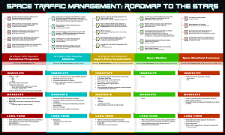Active Debris Mitigation and Rescue Insurance
Presentation Type
Poster
Location
Henderson Welcome Center
Start Date
15-1-2018 8:00 AM
Abstract
Active Debris Mitigation and Rescue Insurance is a preliminary concept that attempts to fill a void in the current spacecraft insurance services market. The current Insurance model is based on a financial pay out on the policy if certain off-nominal events happen in preparation of, during, and after launch. It has been observed that currently there is not a business plan for physical insurance. Rather than monetary insurance that pays money in the instance of an off-nominal event, this insurance would sub-contract with other services to actively deorbit an at-risk spacecraft before it becomes a threat to another spacecraft in orbit. It is a pro-active approach to what has so far been a reactive industry. The concept calls for levels of service via third party contracting that would include installing deorbit hardware on spacecraft before launch, an on-orbit service to rendezvous and visually triage a spacecraft to help determine further assistance, launch services rendered to rescue and return stranded crew and spaceflight participants, and actively deorbiting a malfunctioning spacecraft. Orbital services could either be developed to be launched from Earth post-incident or proactively placed in a stand-alone space station. An appealing option would be a module birthed at the international space station as an in-orbit stand-by module. This service could theoretically assist the ISS in debris mitigation maneuvers by not only navigating the ISS away from the debris, but also capturing and deorbiting the debris to eliminate any future threat. In addition to reducing orbital debris before it becomes a problem, this service could be a cheaper stop-gap option used before liability insurance is needed. This insurance concept could also help Launching States keep from inadvertently violating the Outer Space Treaty or the Liability Convention, as well as help government continually monitor on orbit activity or ensure adherence to the rescue and return agreement.
Active Debris Mitigation and Rescue Insurance
Henderson Welcome Center
Active Debris Mitigation and Rescue Insurance is a preliminary concept that attempts to fill a void in the current spacecraft insurance services market. The current Insurance model is based on a financial pay out on the policy if certain off-nominal events happen in preparation of, during, and after launch. It has been observed that currently there is not a business plan for physical insurance. Rather than monetary insurance that pays money in the instance of an off-nominal event, this insurance would sub-contract with other services to actively deorbit an at-risk spacecraft before it becomes a threat to another spacecraft in orbit. It is a pro-active approach to what has so far been a reactive industry. The concept calls for levels of service via third party contracting that would include installing deorbit hardware on spacecraft before launch, an on-orbit service to rendezvous and visually triage a spacecraft to help determine further assistance, launch services rendered to rescue and return stranded crew and spaceflight participants, and actively deorbiting a malfunctioning spacecraft. Orbital services could either be developed to be launched from Earth post-incident or proactively placed in a stand-alone space station. An appealing option would be a module birthed at the international space station as an in-orbit stand-by module. This service could theoretically assist the ISS in debris mitigation maneuvers by not only navigating the ISS away from the debris, but also capturing and deorbiting the debris to eliminate any future threat. In addition to reducing orbital debris before it becomes a problem, this service could be a cheaper stop-gap option used before liability insurance is needed. This insurance concept could also help Launching States keep from inadvertently violating the Outer Space Treaty or the Liability Convention, as well as help government continually monitor on orbit activity or ensure adherence to the rescue and return agreement.

